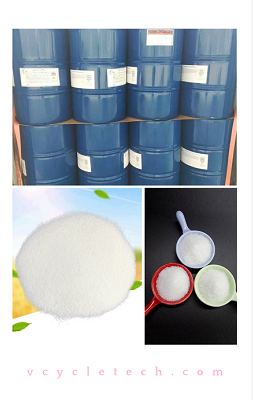Potassium polyacrylate is the potassium
salt of polypropylene with the chemical formula [-CH2-CH(CO2K)-]n. As a super
absorbent polymer, it can absorb its original weight of water in pure water
hundreds of times.
Unlike sodium polyacrylate, potassium
polyacrylate can be used as an agricultural water retention agent and does not
cause soil salinization.
Potassium polyacrylate is a strong
water-absorbing polymer (Ag-SAP) for plants to increase water supply to plants.
When mixed with soil, it can improve the
soil's water retention capacity (the hydrogel form can stay in the soil for
months) and can be used for plants. This amended soil easily releases water
along with water-soluble nutrients to plant roots on demand. Polypropylene
potassium has a weaker residual than the roots of most plants.
It can be used for seed coating, seedlings,
crops, crop surface treatment, tree seeding/transplanting, and flower
transport.
Mechanism of action.
Polypropylene potassium acts similar to a
sponge under the soil surface. It consists of a set of polymer chains that are
chemically linked together into a water-insoluble web-like matrix and ground to
absorb and hold hydrogen molecules. Its molecular structure's enormous size and
weight allow the potassium polypropylene particles to absorb more than 500
times their original weight in pure water.
It does not "bind" water.
Polypropylene potassium particles release the right amount of water according
to the water absorption of the plant roots. Standing water and other
"free" water fill the soil stomata without adverse effects.
Polypropylene potassium maximizes plant
growth by reducing plant stress. It also absorbs and releases soil nutrients,
water-soluble fertilizers, and chemicals in the same way as water, creating a
healthy microenvironment in the plant root zone. The result is fast
germination, quick seed emergence, stable growth, less water, and fewer inputs
for high-quality edible plant yields.
Polypropylene potassium is used as a soil
conditioner to improve the water retention capacity of the soil.
Potassium polypropylene without acrylamide.
Advantages: Acrylamide-free, completely harmless Disadvantages: Short
expiration date (soil can be used for 1~3 months).
Potassium polyacrylate absorbs water after
rain or irrigation and becomes a hydrogel... Unlike potassium polypropylene,
sodium polyacrylate's hydrogel does not release water to plants and breaks down
within a few days after mixing with soil. This means that sodium polyacrylate
does not help plants grow.

Ask about the price of potassium
polyacrylate.